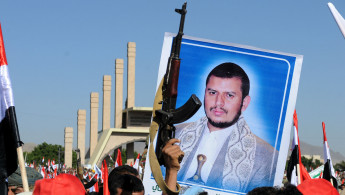Yemen govt accuses rebels of 'ploy' over Hodeida pullout
A senior pro-government official accused Yemen's Houthi rebels of faking an announced pullout from three strategic ports in Hodeida province on Saturday.
"The Houthis are staging a new ploy by handing over the ports of Hodeida, Saleef and Ras Issa to themselves without any monitoring by the United Nations and the government side," provincial governor Al-Hasan Taher told AFP.
The remarks came after Yemen’s Houthi rebels said they were set to begin a unilateral withdrawal from the lifeline port of Hodeida on Saturday, in a bid to kickstart implementation of a December truce brokered by the UN.
The head of the rebels' Supreme Revolutionary Committee, Mohammed al-Houthi, said fighters would start pulling back at 10 am (0700 GMT).
He said the rebels had been forced to act unilaterally after the Saudi-backed government repeatedly delayed a parallel pullback from parts of the city of Hodeida that it had pledged to make under the truce deal reached in Sweden.
"The (rebel) army and committees are withdrawing unilaterally as a result of the refusal of the countries of the US-British-Saudi-Emirati aggression and their allies to implement the accord," the rebel leader said on Twitter.
Hodeida is the main entry point for the bulk of Yemen's imports and humanitarian aid, providing a lifeline to millions of civilians who have been pushed to the brink of famine by more than four years of devastating conflict.
On Friday, the United Nations announced that the rebels would begin a long-delayed withdrawal from Hodeida and two other Red Sea ports on Saturday, the first step on the ground since the hard-won ceasefire deal was reached.
The agreement was hailed as a breakthrough that offered the best chance so far of ending the war in Yemen.
But although the fighting has largely stopped, there have been intermittent clashes and the promised redeployment of the warring parties away from the front lines has failed to materialise.
The withdrawal of rebel forces will now be completed by Tuesday, the head of the UN redeployment committee, General Michael Lollesgaard, said in a statement.
A UN observer mission led by Lollesgaard will monitor the pullback.
Govt demands verification
The information minister of the internationally recognised government, Moammer al-Eryani, welcomed the UN announcement but demanded joint verification of the promised rebel withdrawal.
"We welcome any measures towards the implementation of the Sweden agreement on redeployment in ports in Hodeida province and warn of attempts by the militia to mislead the international community and the (UN) Security Council before the next meeting," Eryani tweeted.
He said any unilateral redeployment by the rebels without control and joint verification "cannot be accepted."
Lollesgaard welcomed the rebel plan "to undertake an initial unilateral redeployment from the ports of Hodeida, Saleef and Ras Issa."
Saleef is a minor port further up the Red Sea coast that is planned for development as a grain import hub.
Ras Issa is an oil export terminal for the oilfields in Marib province in the government-controlled interior.
Untapped grain stocks
Nearly all goods, including vital aid deliveries of grain, currently pass through Hodeida.
The main storage and distribution centre for the imported grain lies in government-held territory on the outskirts of the city.
The silos of the Red Sea Mills currently contain some 51,000 tonnes of grain - enough to feed 3.7 million people for a month - but it has gone unused since the fighting forced the UN to withdraw its staff in September.
After an initial inspection visit in February, a World Food Programme team finally gained access to the silos last Sunday after a month of delays for security reasons.
But the mills came under renewed fire on Thursday, with two silos hit, one of them containing wheat, the UN said.
The United Nations had announced a deal in February for phased pullbacks by the two sides, but its implementation faltered over rebel concerns that forces linked to the Saudi-led coalition would exploit it to take over the ports.
The coalition intervened in Yemen in March 2015 when President Abedrabbo Mansour Hadi fled into Saudi exile as the rebels closed in on his last refuge in second city Aden after sweeping though most of the rest of the country.
The conflict has killed tens of thousands people, many of them civilians, relief agencies say.
The fighting has triggered what the United Nations describes as the world's worst humanitarian crisis, with 24.1 million - more than two-thirds of the population - in need of aid.
Follow us on Twitter: @The_NewArab





 Follow the Middle East's top stories in English at The New Arab on Google News
Follow the Middle East's top stories in English at The New Arab on Google News


![22 Arab countries at COP29 have rejected the targeting of fossil fuels [Getty]](/sites/default/files/styles/image_330x185/public/2024-11/GettyImages-2184289638.jpg?h=199d8c1f&itok=ptHl5bec)